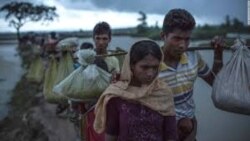News headlines • Coronavirus: US tells citizens not to travel to China as WHO declares global emergency • US ambassador stresses close ties with Myanmar despite tension over the Rakhine crisis • Egypt’s Grand Mufti Al-Azhar hails Gambia for supporting Rohingya Muslims at ICJ • United Kingdom pledges £8 million in new WFP food aid for Rohingya refugees • Bangladesh counters human trafficking of Rohingya with schools Shortwave, 31-meter band 9310 kHz 25-meter band, 11570 kHz, 12030 kHz Bridge … Report: Mohammed Idris Abdullah (stringer) Topic: A volunteer with Relief International discusses child protection in Balukhali Camp 18. Translation summary: In overcrowded refugee settlements, children face risks of abuse, exploitation and psychological distress, as ReliefWeb points out. Relief International is among the aid groups working in Camp 18, on the megacamp’s western border, to improve conditions for its more than 9,000 youths under age 17. Yousuf Ali volunteers with Relief International, trying to protect youngsters from dangers and difficulties. RI’s child protection volunteers go from home to home in the camp, checking whether youngsters have sufficient food, shelter, schooling and health care, the 28-year-old told a VOA journalist who visited his home. RI also provides youngsters with items from shoes to books to umbrellas. Ali farmed in Moungna Para village in Myanmar’s Buthidaung township before fleeing with his family to Bangladesh in late August 2017. In his new position, he has found new challenges: With limited opportunity for schooling in Myanmar, some Rohingyas don’t understand the value of education and so don’t enroll their children in learning centers. Some allow health problems to go untreated, creating bigger problems. Child protection volunteers meet with parents, teachers and religious and camp leaders to correct such problems, Ali said. Bridge … 2-way report: co-host Hussain with Mohammed Rukon Uddin (stringer) Topic: Can Rohingya refugees be repatriated to Myanmar, or is a third country in their future? Summary: Abdul Malek lives in Kutupalong Camp 2 and questions whether he ever will be able to return to Myanmar. The 38-year-old fled to Bangladesh after August 2017. “Myanmar authorities destroyed all of our property with bulldozers in our homeland. The government wanted to put all the Rohingyas in camps and not return our belongings,” he said. “… The reason for not taking us back is to occupy all our property. … We would be happy if they gave us everything back, including our citizenship.” Entire villages of Muslim Rohingyas have been demolished and replaced by police barracks, government buildings and refugee relocation camps, the BBC reported last September after its reporter joined in a Myanmar government-led press tour of several sites that, satellite imagery shows, previously had held Rohingya villages. Myanmar had organized the tour to show its readiness to receive returning Rohingyas. (Earlier UN fact-finding mission and rights groups’ research also had concluded – based on satellite imagery, witness accounts and more – that whole villages have been wiped out.) Mohammed Islam, 42, is less certain about whether Rohingyas can return to Myanmar. There, “we have faced torture, violence, killings,” said Islam, who lives in Kutupalong Camp 2. He urged supporters of Rohingyas’ rights to continuing working toward their safe repatriation so “we can live peacefully and practice our religion.” He said if Rohingyas can’t safely return to Myanmar, he requests that Islamic states or those where Islam is the state religion consider resettling Rohingyas to third countries “for our better future, as there is no future for our generation here in the camps.”
খন্ড
-
![]() জানুয়ারী ১৬, ২০২৬
জানুয়ারী ১৬, ২০২৬Rohingya Broadcast
-
![]() জানুয়ারী ১৫, ২০২৬
জানুয়ারী ১৫, ২০২৬Rohingya Broadcast
-
![]() জানুয়ারী ১৪, ২০২৬
জানুয়ারী ১৪, ২০২৬Rohingya Broadcast
-
![]() জানুয়ারী ১৩, ২০২৬
জানুয়ারী ১৩, ২০২৬Rohingya Broadcast
-
![]() জানুয়ারী ১২, ২০২৬
জানুয়ারী ১২, ২০২৬Rohingya Broadcast
-
![]() জানুয়ারী ০৯, ২০২৬
জানুয়ারী ০৯, ২০২৬Rohingya Broadcast







